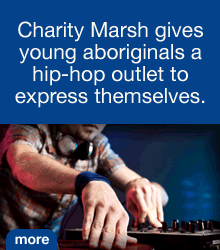Social Sciences Can Improve Health of Canadians
Jacqueline LeBlanc Cormier, Experience Congress 2011
The Canadian Institutes for Health Research (CIHR) wants to remind social scientists and humanists that it accepts grant applications for a broad range of health-related research- not just clinical or medical studies.
Recent changes to funding eligibility for Social Sciences and Humanities Research Council (SSHRC) grants for health-related research have left some researchers confused on where to go for funding.
That’s why Valérie Turcot is representing CIHR at the Congess of the Social Sciences and Humanities in Fredericton. She’s at the CIHR booth in the Currie Center to answer questions about how CIHR works with social scientists and humanists. She’s also doing short interviews with passersby about the role of the social sciences on the health of Canadians.
“They [social scientists and humanists] can fit in many of our funding opportunities but they may not know about them,” she explains. “Our funding is split between four pillars and one of those pillars is social, cultural, environmental and population health.”
This pillar has many interesting research opportunities for social scientists and humanists and can include topics ranging from aboriginal peoples’ health; gender, sex and health; and social dimensions in aging, among so many others.
“CIHR aims to cover all subjects that are health-related, not only those that have a clinical or medical aspect,” Turcot adds. “While covering all aspects of health, whether that be physical, mental or social health, research contributes to improving the quality of the health of all Canadians, whether they live in urban or rural Canada, and in all segments of the population.”
Examples of research in the social sciences and humanities funded by CIHR:
• An ethnographic study of adolescents’ conceptualization of cancer and cancer prevention
• Young men’s responses to the accidental death of a friend
• The role of housing in promoting and maintaining the health of victims of domestic violence
• Patient Narratives (History of Medicine)
• Marginalized Youth in Contemporary Educational Contexts
• The Culture and Context of Adolescent Marijuana Use
For more information on funding opportunities with CIHR, please visit the CIHR booth in the Currie Center, or visit the CIHR website’s funding section.













